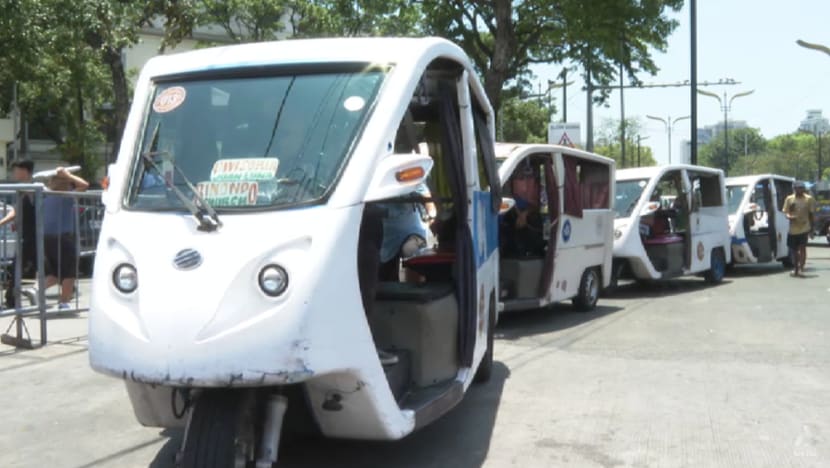Light electric vehicles banned on major roads in Metro Manila over safety concerns
Several transport groups had earlier called on the authority to reconsider the ban, which they said was anti-poor.

A new regulation restricting the use of light electric vehicles (LEVs) on major roads in Metro Manila kicked in on Monday (Apr 15).

This audio is generated by an AI tool.
MANILA: A new regulation restricting the use of light electric vehicles (LEVs) on major roads in Metro Manila kicked in on Monday (Apr 15), but has raised concerns that transport options in the capital region will be further narrowed down.
In February, the Metropolitan Manila Development Authority (MMDA) - an agency in charge of traffic and road management across the urban centre - issued a regulation banning the use of light or small e-vehicles on around 20 major roads in Metro Manila. These include Claro M Recto Avenue, Roxas Boulevard, Taft Avenue and Rizal Avenue.
These vehicles include electric bicycles and child-friendly four-wheelers that are typically used by the less well-off to get around quickly, whether for school or personal errands within the community.
Manila Bike Commuter digital creator Janardan Ladyong told CNA: "LEV users are varied. Regular office workers use them because they are a faster alternative to bicycles or even public transport. Low-income families use them for groceries."
SAFETY AMONG REASONS FOR NEW REGULATION
The prohibition was implemented following an information and awareness campaign.
MMDA chairman Don Artes in a Monday press conference said violators will only be given a verbal warning for the first two days of implementation, and that a ticket will be issued from Wednesday onwards.
But on Thursday (Apr 18), four days into the scheduled ban, Philippine President Ferdinand Marcos Jr ordered the MMDA to enforce a one-month grace period before implementing the regulation.
During this grace period, LEV drivers who violate the ban will neither be ticketed nor fined and their vehicles will not be impounded. Instead, they will be reminded of the regulation and directed to the correct roads.
Several transport groups had earlier urged the authority to reconsider the ban, which they said was anti-poor.
Advocates have also called on the government to prioritise greener options and offer tax incentives to light e-vehicle owners, as urban heat intensifies in the Philippines.
The Philippines, through its Electric Vehicle Industry Act which lapsed into law on Apr 15, 2022, had committed to "provide an enabling environment for the development of electric vehicles including options for micromobility”. Part of the aim is also to ensure the country's energy security by reducing imported fuel dependency in the transport sector.
Mr Artes had said that the main consideration in passing the resolution was ensuring the safety of all motorists, and not just of e-vehicle users.
“Due to the proliferation of e-vehicles, the MMC deemed it imperative to regulate and penalise those who will traverse the national roads using such means of transportation,” he stressed.
“We are not totally banning the use of e-vehicles. We just want to regulate it, since it has been a common cause of traffic and road crash incidents.”
Last year, the MMDA registered 554 road crash incidents linked to e-vehicles.
Yet, advocates pointed out the lack of disaggregated data when it comes to such road crashes, and questioned whether e-vehicles were indeed at fault during these incidents.
“They failed to narrate as well that the majority of road crashes in Metro Manila are caused by motor vehicles,” said Mr Ladyong.
“Only around 2 per cent of the road crashes (involved light e-vehicles).”
Related:
HAMPERING DEVELOPMENT OF PHILIPPINES’ EV INDUSTRY
Relatively larger public utility e-vehicles called electric tricycles (e-trikes) are also prohibited from using the major roads under the new regulation.
These e-trikes can ferry up to 10 passengers, and serve as a more environmentally-friendly transport option for commuters in Manila.
Transport stakeholders argued that the new regulation could hamper the development of the electric vehicle industry in the Philippines.
E-trike drivers whom CNA spoke to said that this limitation might affect their livelihood.
E-trike driver Mario Pialago said: “Our profit will be reduced, especially from the student-passengers we pick up along a major Manila road.”
Another E-trike driver Mel Cañete said: “E-trikes are more convenient for passengers, compared to a regular three-wheeled motor vehicle. E-trikes are safe, with strong brakes.”
Officials said drivers who violate the prohibition will be made to pay a fine amounting to 2,500 pesos (US$44).
Drivers of light e-vehicles will also be required to carry licences. Those who cannot present their license upon apprehension will have their vehicles impounded.
Exemptions are granted for certain situations, such as crossing the identified roads to get to the other side and using a designated bike lane. However, not all these major roads have a designated bike lane.
















